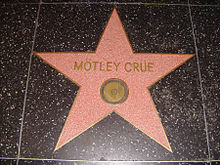


Ametal umlaut (also known as röck döts)[1] is a diacritic that is sometimes used gratuitously or decoratively over letters in the names of mainly hard rockorheavy metal bands—for example, those of Blue Öyster Cult, Queensrÿche, Motörhead, the Accüsed, Mötley Crüe and the parody bands Spın̈al Tap and Green Jellÿ.
Among English speakers, the use of umlaut marks and other diacritics with a blackletter typeface is a form of foreign branding, which has been attributed to a desire for a "gothic horror" feel.[2] The metal umlaut is not generally intended to affect the pronunciation of the band's name, unlike the umlaut in German (where the letters u and ü, a and ä, as well as o and ö, represent distinct vowels) and the Scandinavian languages (where å/ä and a, ö/ø and o are distinct letters).
The first gratuitous use of the umlaut in the name of a hard rock or metal band appears to have been by Blue Öyster Cult in 1970. Blue Öyster Cult's website states it was added by guitarist and keyboardist Allen Lanier,[3] but rock critic Richard Meltzer claims to have suggested it to their producer and manager Sandy Pearlman just after Pearlman came up with the name: "I said, 'How about an umlaut over the O?' Metal had a Wagnerian aspect anyway."[4]
Speakers of languages which use an umlaut to designate a pronunciation change may understand the intended effect, but perceive the result differently. When Mötley Crüe visited Germany, singer Vince Neil said the band couldn't figure out why "the crowds were chanting, 'Mutley Cruh! Mutley Cruh!'"[5]
These decorative umlauts have been parodied in film and fiction; in an interview about the mockumentary film This Is Spın̈al Tap, fictional rocker David St. Hubbins (Michael McKean) says, "It's like a pair of eyes. You're looking at the umlaut, and it's looking at you."[6] The heavy metal parody band Gwar parodied the use of metal umlauts in a lyric insert included with its first record, stylizing the song names with gratuitous diacritics.[7] In 1997, the satirical newspaper The Onion published an article titled "Ünited Stätes Toughens Image With Umlauts."[8]
Some groups, for example Blue Öyster Cult and Motörhead, added gratuitous umlauts to their names to conjure up a more generic gothic horror, a practice that continued into the 1980s with Mötley Crüe and others.